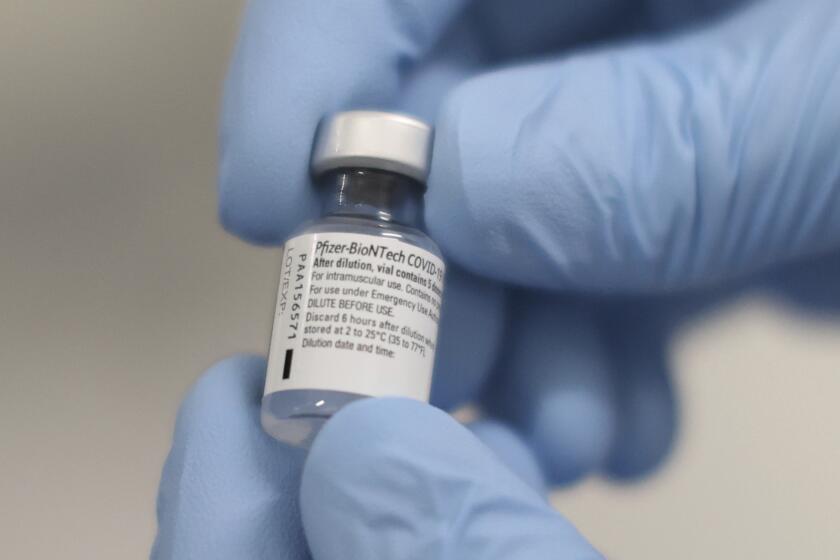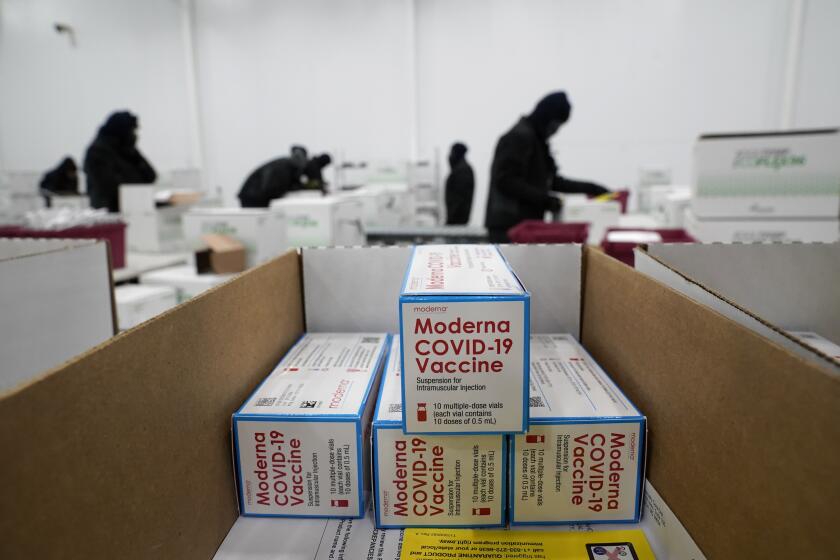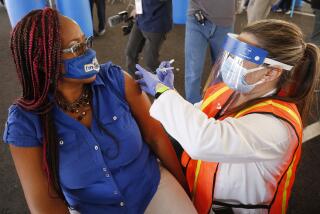Tracking who gets vaccinated is vital for public health, but it’s raising privacy concerns

For years, California and other states have collected detailed personal data from those getting immunizations to ensure children received the required shots.
With the rollout of COVID-19 vaccines, experts say the collection of names, addresses, birth dates and other information will be vital to tracking the safety and effectiveness of products that were developed in record time.
But there are concerns that the plan to collect such data could stop some of those most vulnerable to the coronavirus, including essential workers who are in the country illegally, from lining up for vaccination.
“There has to be an exemption for people who are afraid to provide all their information,” said Jim Mangia, chief executive of St. John’s Well Child and Family Center, a nonprofit that is planning to soon deliver tens of thousands of shots a week at its clinics, which serve low-income families in South and Central Los Angeles. “Otherwise you’re going to have vast numbers of people who are not going to get vaccinated.”
Other public health experts say the collection of data is crucial for safely administering doses and that patients have little to fear.
“The benefits exceed any risks,” said Walter Orenstein, who ran the immunization program at the federal Centers for Disease Control and Prevention from 1988 to 2004 and is now the associate director of the Emory Vaccine Center.
COVID-19 vaccines are now being administered to healthcare workers in the U.S. What are your questions about the timeline, the safety or the science?
Orenstein said that even though such personal data have been recorded in state vaccine registries for more than 25 years, he had never learned of a case in which it was used to determine someone’s immigration status.
State and federal health officials have explained that the data collection is needed to ensure patients received the required second dose of the vaccines manufactured by Pfizer and Moderna. The data will also help assess the vaccines’ effectiveness among different demographic groups.
Alarms first sounded this fall when the Trump administration asked every state to agree to share with the federal government personal data collected from patients and stored in vaccine registries at the state level.
In October, four organizations representing state health officials from the across the country wrote to Robert Redfield, head of the CDC voicing concerns. People would shun the COVID-19 vaccine, they wrote, if the federal government insisted on obtaining the detailed personal information that the states were preparing to collect from vaccine recipients.
Among those who may be most hesitant to share information, the state officials wrote, are migrant farmworkers and those employed by meat-processing plants, which have had some of the nation’s largest workplace outbreaks of COVID-19.
This month, California negotiated a deal with the CDC to limit the personal data shared with the federal government to birth year, sex and the county where the vaccine was administered. State officials say the federal government will not be able to identify the person through that limited data.
But vaccine recipients will still be required to provide more extensive personal information to the California vaccine registry. According to the state’s written vaccine plan, recipients must provide their name, address, sex, date of birth, ethnicity and race. Doctors must also record whether the patient refused the vaccine.
The patient information will be collected in California’s Immunization Registry, known as CAIR.
The development comes as the nation seeks to ramp up a vaccination program, begun last week, that so far has given initial shots to about 556,000 Americans.
For years, the registry has enabled doctors to quickly find what vaccinations a child has had and still needs, even when those shots are given at multiple clinics and locations.
School districts and child care centers have access to the registry data to determine what vaccines their students have received.
Ali Bay, deputy communications director for the state’s Department of Public Health, declined to comment about whether employers would have access to the registry to determine if an employee had received the COVID-19 vaccine.
She also declined to comment about whether the state could allow patients to get the vaccine if they refused to provide their name and other personal information.
Doctors and clinics who want to provide the COVID-19 vaccine must sign a federal agreement requiring them to send each patient’s detailed personal information to the state’s vaccine registry within 24 hours.
Mangia at St. John’s Well Child and Family Center said his group was only now learning of some of the government requirements for providing the vaccines.
The group has purchased freezers that can store 25,000 doses of the Pfizer and Moderna vaccines at a time, he said.
Once health workers and others given priority have been vaccinated, the group’s network of clinics is planning mass vaccination events at gymnasiums in partnership with the Compton Unified School District, Mangia said. The clinics also plan to send out three mobile vaccination units to neighborhoods.
As many as 30% of patients at the group’s clinics in recent days have been positive for the coronavirus, he said.
Mangia said the clinics’ staff performs contract tracing when patients test positive and has found that many got infected at work.
“They get sick, they come home and they give it to their families,” he said.
He said the clinics annually provide medical care to 30,000 to 40,000 people who had entered the country illegally. Nurses and doctors often struggle to persuade immigrants to get the medical care they need, he said, because of their fears it could lead to an investigation by federal immigration officials.
Mangia said that clinics needed the flexibility to provide the vaccine even if the patient hesitates to provide information.
“What is the state going to do to ensure that people who, for whatever reason, are uncomfortable giving all of that information can still get vaccinated?” he asked.
California government statistics show that poor neighborhoods, where families often live in tight quarters, have been hit hard by COVID-19.
By analyzing that data, The Times has found that Latino people are now 2.6 times more likely than white people to test positive. And among most age groups, and especially younger people, Black and Latino people are dying more often than other groups relative to their share of the population.
State officials say they are working on a campaign to educate communities across California about how the vaccines can help protect them and their families from a virus that has been blamed for the death of almost 24,000 residents.
In an email, Bay in the state’s public health department said officials were “conducting extensive outreach in 13 languages to promote vaccination.” The campaign includes “messaging about privacy, confidentiality and data use,” she said.
“California law strictly limits how personal information about people who receive vaccines can be shared,” Bay wrote, without further explaining those limits.
John Swartzberg, clinical professor emeritus at UC Berkeley’s School of Public Health, said it was “critical that any data obtained is never used for any purpose other than the public’s health.”
But he added it was also crucial to collect the data, including at the national level. “Without knowing the demographics of who has received the vaccine and when and where,” he said, “we will be going into the future with a blindfold on.”
More to Read
Inside the business of entertainment
The Wide Shot brings you news, analysis and insights on everything from streaming wars to production — and what it all means for the future.
You may occasionally receive promotional content from the Los Angeles Times.













